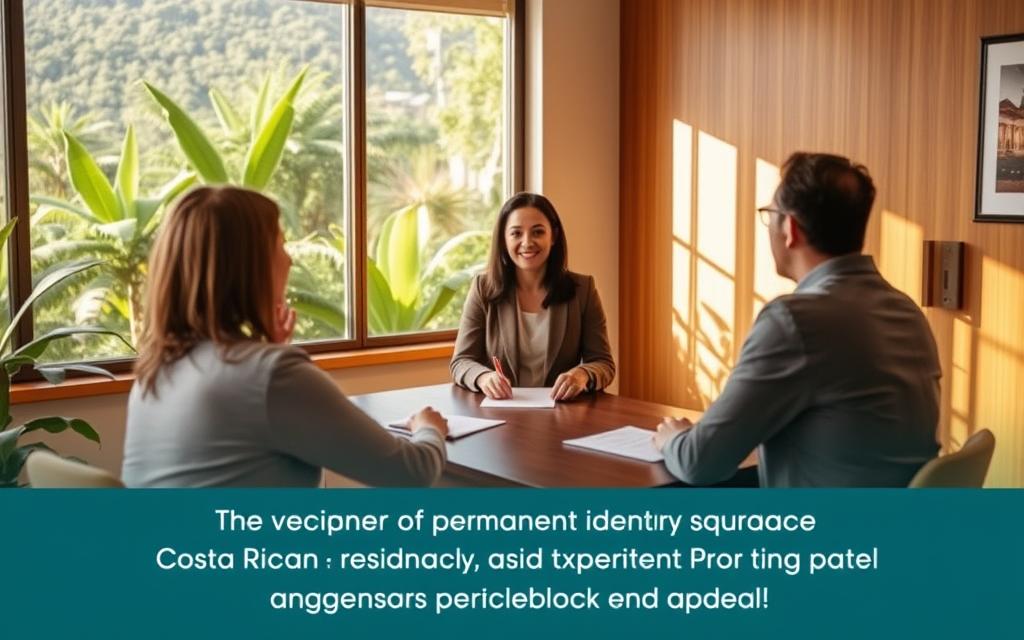Can Permanent Residents Work in Costa Rica? | JARO S.C.R.

Did you know that over 10% of Costa Rica’s population consists of expats? This tropical paradise attracts families and individuals seeking a higher quality of life. With its stunning natural beauty, moderate climate, and rich cultural experiences, it’s no wonder many choose to call this country home.
Costa Rica offers various residency options, including rentista, investor, and permanent residency. These programs allow foreign nationals to live long-term while enjoying benefits similar to those of Costa Rican citizens. Understanding the legal requirements and processes is essential for a smooth transition.
At JARO S.C.R., we guide you through every step, from financial proof to document legalization. Let us help you explore the opportunities this vibrant country has to offer.
Understanding Costa Rica Residency Options
Costa Rica’s residency programs cater to a wide range of lifestyles and financial goals. Whether you’re seeking a relaxed retirement or aiming to invest in the country’s thriving economy, there’s a visa option tailored to your needs. Understanding these choices is key to making an informed decision.
Rentista Residency
For those with a stable income, the Rentista Residency is an excellent choice. Applicants must demonstrate a minimum monthly income of $2,500, guaranteed for at least five years. This option is ideal for individuals with pensions or investments who wish to enjoy the country’s lifestyle without engaging in local employment.
Investor and Permanent Residency
Investor Residency requires a minimum investment of $200,000 in real estate or a local business. This program not only grants residency but also opens doors to economic opportunities. After maintaining temporary residency for three years, individuals can apply for permanent status, gaining rights similar to citizens.
Each residency type has specific document and legal requirements, including translations and notarizations. At JARO S.C.R., we ensure your application meets all criteria, helping you navigate the process smoothly.
Overview of Temporary vs. Permanent Residency
Understanding the differences between temporary and permanent residency is crucial for planning your stay. Each option serves distinct purposes and comes with unique benefits. Temporary residency is ideal for those testing the waters, while permanent residency offers long-term stability.
Eligibility Criteria
Temporary residency requires proof of income or investment. For retirees, a monthly pension of $1,000 is necessary. Rentiers must show $2,500 monthly income, while investors need a $200,000 investment in real estate or a local business. Permanent residency, on the other hand, is available after three years of temporary status.
Both types of residency demand thorough documentation. Birth certificates, police clearance, and financial proof are essential. All foreign documents must be translated into Spanish and notarized for submission.
Renewal Process
Temporary residency permits are valid for two years and require renewal. Applicants must provide updated financial proof and legal documents during this process. Missing deadlines or incomplete submissions can delay or jeopardize your status.
After three years of temporary residency, individuals can apply for permanent status. This transition grants rights similar to citizens, including employment opportunities. Proper planning and adherence to requirements ensure a smooth transition.
At JARO S.C.R., we guide you through every step, from eligibility to renewal. Our expertise ensures your application meets all criteria, helping you achieve your residency goals in Costa Rica.
Can permanent residents work in Costa Rica?
One of the most common questions among expats is about employment rights. For those holding permanent residency, the answer is clear: they enjoy the same employment opportunities as citizens. This includes access to a wide range of sectors, from tourism to technology.
The verification process is straightforward but requires attention to detail. Applicants must submit valid proof of income and a passport to confirm their eligibility. These documents are essential for maintaining residency status and ensuring compliance with local laws.
Transitioning from temporary to permanent status simplifies work eligibility. Temporary residents often need a separate permit, but permanent status removes this requirement. This makes long-term planning easier for those looking to build a career in the country.
For example, many individuals have successfully transitioned to permanent residency after three years of temporary status. This process allows them to work freely without additional permits. For more details on residency options, visit our guide on how to get residency in Costa.
Understanding these rights is crucial for anyone considering a move. With the right preparation, permanent residents can fully integrate into the workforce and enjoy the benefits of living in this vibrant country.
Navigating the Costa Rican Work Permit Process
Securing a work permit in Costa Rica involves a detailed process that requires careful preparation. From gathering documents to understanding timelines, each step is crucial for success. Proper planning ensures compliance with local laws and a smooth transition into the workforce.
Document Requirements
Applicants must provide notarized copies of their passport and birth certificate. Police clearance and proof of financial stability are also mandatory. All documents must be translated into Spanish and legalized if originating from non-Apostille Convention countries.
Employers play a key role in the process. They must submit a signed letter of guarantee and proof of economic solvency. These documents ensure the applicant’s eligibility and adherence to local regulations.
Application Timeline
The work permit process typically takes three to eight months. Delays can occur if documents are incomplete or require additional verification. Applicants should plan accordingly to avoid disruptions in their employment plans.
For temporary residents, employers must initiate the application. This ensures compliance with local laws and streamlines the process. Investor and citizen ties may expedite approval, but thorough preparation remains essential.
Understanding these steps helps applicants navigate the process with confidence. Proper documentation and adherence to timelines are key to securing a work permit in Costa Rica.
Employment Opportunities for Residency Holders
Costa Rica’s diverse economy offers numerous job opportunities for those with a residence permit. With rights similar to citizens, individuals can explore various sectors without the need for additional permits. This flexibility makes it easier to adapt to changing career paths or market demands.
Job Sectors Open to Permanent Residents
Several industries welcome individuals with a residence permit. The tech sector, for example, is thriving, with many multinational companies operating in the country. Business, health, and education are also popular fields, offering stable and rewarding careers.
One of the key advantages of a residence permit is the ability to switch roles without applying for a new work permit. This saves time and simplifies the process for those looking to advance their careers. Market demand and government regulations play a role in shaping these opportunities.
For instance, the healthcare sector often seeks bilingual professionals, while education institutions value experienced teachers. These examples highlight the diverse options available to residency holders. Understanding these opportunities can help individuals make informed decisions about their future in Costa Rica.
Legal Requirements for Working in Costa Rica
Navigating the legal landscape for employment in Costa Rica requires clarity on permits and regulations. Understanding the differences between a work permit and a residence permit is essential for compliance and avoiding legal issues. Proper documentation and adherence to the regulatory framework ensure a smooth process.
Work Permit vs. Residence Permit
A work permit is specifically for employment, while a residence permit allows long-term stay. Temporary residents often need a separate work permit to legally engage in employment. Permanent residency holders, however, enjoy the same employment rights as citizens without additional permits.
For example, those with temporary residency must provide proof of income and employer sponsorship. Permanent residency simplifies this process, eliminating the need for separate work authorization. This distinction is crucial for planning your career in the country.
Regulatory Framework
Costa Rican law prioritizes citizens over foreigners in employment opportunities. The regulatory framework ensures that all permits meet legal standards. Documents must be translated into Spanish and notarized to be valid.
Failure to follow these procedures can result in fines or legal complications. Proper preparation, including financial proof and police clearance, is essential. For expert guidance, visit our Costa Rica legal services page.
Understanding these requirements helps you navigate the process confidently. Compliance with local laws ensures a seamless transition into the workforce.
Challenges in Obtaining Work Permits
Foreign nationals often face hurdles when applying for work permits in this tropical nation. The process is designed to prioritize local candidates, making it competitive for expats. Understanding these challenges is key to navigating the system effectively.
Priority for Costa Rican Citizens
Local laws favor citizens over foreign applicants. Employers must prove that no qualified Costa Rican candidate is available before hiring an expat. This requirement adds complexity to the application process, especially for temporary residents.
For example, many positions in sectors like tourism and education are reserved for locals. This limits opportunities for foreign nationals, even those with specialized skills. Applicants must demonstrate unique qualifications to stand out.
Bureaucratic and Documentation Hurdles
The work visa application process involves extensive paperwork. Documents must be translated into Spanish and notarized, which can be time-consuming. Missing or incomplete submissions often lead to delays or rejections.
Processing times can range from three to eight months, depending on the category. Applicants should plan ahead and ensure all requirements are met to avoid disruptions. Proper preparation is essential for success.
Tips for Strengthening Your Application
To improve your chances, provide detailed proof of qualifications and experience. Highlight skills that are in demand but scarce among local candidates. A strong application can make a significant difference in the approval process.
For expert guidance on navigating these challenges, visit our Costa Rica legal services page. We’re here to help you every step of the way.
How We Can Support Your Residency Journey
Navigating the residency process can feel overwhelming, but professional support makes it manageable. At JARO S.C.R., we specialize in guiding individuals through every step, ensuring a seamless experience. Our expertise and personalized approach set us apart, making your journey stress-free and efficient.
Expert Guidance
Our team provides step-by-step assistance, from initial applications to final approvals. We handle document legalization, translation, and submission, ensuring all requirements are met. Whether you’re applying as a rentista, investor, or another type of applicant, we tailor our services to your unique needs.
Tailored Assistance
Every client’s situation is different, and we adapt our approach accordingly. For workers seeking employment opportunities or companies investing in the local economy, we offer customized solutions. Our goal is to simplify the process, helping you achieve your residency goals without unnecessary delays.
With over 20 years of experience, we’ve helped countless individuals successfully navigate the system. Our proven track record speaks for itself, and we’re here to support you every step of the way. Let us handle the complexities so you can focus on your future.
Preparing Your Application and Documents
Proper preparation of your application and documents is the foundation for a successful residency journey. Ensuring all paperwork is accurate, translated, and legalized can save time and prevent delays. This section outlines the essential steps to streamline your process.
Document Translation and Legalization
Every document, from passport copies to bank statements, must be translated into Spanish. Accurate legal translation is crucial for compliance with local regulations. Notarization and apostille certification may also be required, depending on the document’s origin.
For example, police clearance certificates and birth certificates often need additional legalization. This ensures they are recognized by Costa Rican authorities. Proper preparation of these documents is essential for a smooth application process.
Financial Proof Requirements
Proof of financial stability is a key component of your application. Bank statements showing consistent income are often required to demonstrate your ability to support yourself. For certain visas, a minimum monthly income or lump sum deposit is mandatory.
Employers may also need to provide proof of economic solvency when sponsoring a work permit. Ensuring all financial documents are accurate and up-to-date is critical. This helps avoid delays or rejections during the application process.
At JARO S.C.R., we assist with every step, from document preparation to submission. Our team ensures all requirements are met, helping you achieve your residency goals. For more information on the benefits of naturalization, visit our naturalization benefits in Costa Rica page.
Insights into Business and Investment Residency
Investing in Costa Rica’s economy offers more than just residency—it’s a gateway to growth. Business and investment residency programs provide a unique opportunity to contribute to the country’s development while securing long-term benefits for yourself. These programs are designed to attract individuals who are ready to make a meaningful impact.
Contributing to Costa Rican Economy
Investor residency requires a minimum investment of $200,000 in real estate, local businesses, or approved projects. This investment not only grants residency but also stimulates economic growth. By creating jobs and supporting local industries, investors play a vital role in the country’s development.
Detailed business plans are essential for approval. These plans must demonstrate how the investment will benefit the local economy. For example, investing in tourism or agriculture can have a significant positive impact. Each step of the process is carefully reviewed to ensure compliance with local regulations.
Applicants must also provide a certificate of good conduct and proof of financial stability. These documents are critical for the application process. Additionally, a fee is required for processing and legalization. Proper preparation of these materials ensures a smooth and efficient experience.
At JARO S.C.R., we guide you through every step, from initial planning to final approval. Our expertise ensures your application meets all requirements, helping you achieve your residency goals while contributing to Costa Rica’s vibrant economy.
Advantages of Living and Working in Costa Rica
Living in this tropical paradise offers more than just stunning views—it’s a gateway to a fulfilling lifestyle. Beyond the paperwork and legalities, the country provides rich cultural experiences and a superior quality of life. Its mild climate, diverse landscapes, and vibrant traditions make it a top choice for expats and industry experts alike.
Cultural Enrichment
Costa Rica’s cultural scene is as vibrant as its natural beauty. From traditional festivals to local art, there’s always something to explore. The welcoming nature of the community makes it easy to integrate and feel at home. Learning Spanish and participating in local customs deepen your connection to this rich heritage.
Local traditions, such as the annual Palmares Festival, showcase the country’s lively spirit. These events offer a glimpse into the heart of Costa Rican culture. Engaging with these experiences enriches your daily life and broadens your perspective.
Quality of Life Benefits
The quality of life here is unmatched. High-quality healthcare and education systems ensure peace of mind for families. Natural resources like pristine beaches and lush rainforests provide endless opportunities for outdoor activities. These elements combine to create a balanced and fulfilling lifestyle.
For example, healthcare contributions range from 7% to 11% of income, making it accessible for most. Private healthcare visits cost around $65 to $85, offering affordable options for specialized care. This accessibility enhances overall well-being and security.
Relocating here also means enjoying a friendly community and a slower pace of life. Whether you’re exploring local markets or relaxing on the beach, every day feels like a new adventure. These advantages make Costa Rica an ideal place to live and thrive.
Tips for a Smooth Immigration Process
A smooth immigration journey starts with proper preparation and attention to detail. By following a clear plan and avoiding common pitfalls, you can ensure a seamless experience. Here’s how to navigate the process with confidence.
Application Checklist
Start by gathering all required documents. These include your passport, birth certificate, and proof of financial stability. Ensure each document is translated into Spanish and notarized if necessary. Missing or incomplete paperwork is a common cause of delays.
For those making an investment, include proof of your financial commitment. Bank statements and legal agreements are essential. Double-check each item on the checklist to avoid last-minute surprises.
Avoiding Common Errors
One of the most frequent mistakes is missing deadlines. Keep track of important dates, such as application submission and renewal periods. Set reminders to stay on top of these timelines.
Another common error is submitting untranslated or un-notarized documents. Always verify that your paperwork meets local requirements. This step ensures your application moves forward without unnecessary delays.
Finally, ensure your birth certificate and other personal documents are up-to-date. Expired or outdated paperwork can lead to rejections. Taking the time to verify each detail saves time in the long run.
At JARO S.C.R., we’re here to guide you every step of the way. Our team ensures your application is complete and accurate, helping you achieve your immigration goals. Let us handle the complexities so you can focus on your future.
Conclusion
Choosing the right path for residency can open doors to a fulfilling lifestyle. With options like investor, rentista, and family ties through marriage, the process is tailored to diverse needs. Each category requires specific documentation, such as proof of income or property investment, ensuring clarity for applicants.
Professional guidance simplifies this journey. At JARO S.C.R., we help you navigate every step, from document preparation to final approval. Our expertise ensures your application meets all requirements, making the process manageable and rewarding.
Take the next step with confidence. Explore our resources and start your application today. Let us support you in achieving your goals and embracing the opportunities ahead.
Article by Jonnathan Morales
Start Today!
Call or WhatsApp (+506) 7182-8969
https://www.jaroscr.com/


